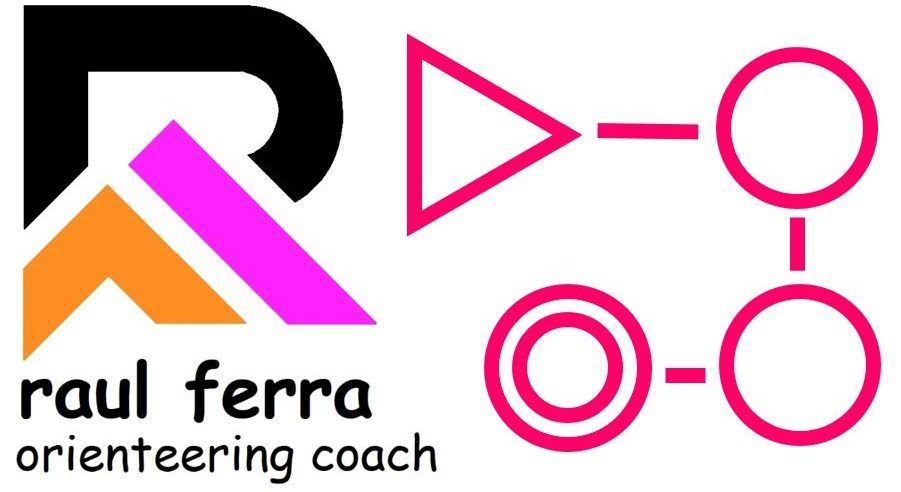A world championship in the heart of Switzerland, with very experienced organizers, and high-level people involved in the technical side of the event, predicted that we were going to enjoy a high-quality event… and so it was!
All races were held in the woods surrounding the town of Flims, using a magnificent arena for all of them (except Middle Q). This aspect can significantly limit the quality of the courses in the final part, something that we saw especially in the last loop of the Relay, although it did not tarnish the good work.

LONG DISTANCE: varied terrain WITH DECISIVE ROUTECHOICES
The course-setters offered challenging courses for Long race, alternating different types of terrain and challenges throughout the course, as well as decisive route choices. From the highest part, the courses began in a semi-open alpine terrain, to go down through steep slopes, and end in a last area with more varied shapes (which would also be used for the relay) and where there was still a route choice leg that would prove to be of great importance.


WOMEN LONG DISTANCE: The first-ever gold medal for Aebersold!
In the women’s class, the Swiss Simona Aebersold got, sweetly at home, her first gold ever in WOC with a magnificent performance, beating the favorite Tove Alexandersson by half a minute. The bronze went to the Norwegian Andrine Benjaminsen… more than 7 minutes behind, and in front of Natalia Gemperle by just 6 seconds, and Sara Hägstrom by 20 seconds. That final battle for the bronze was exciting!
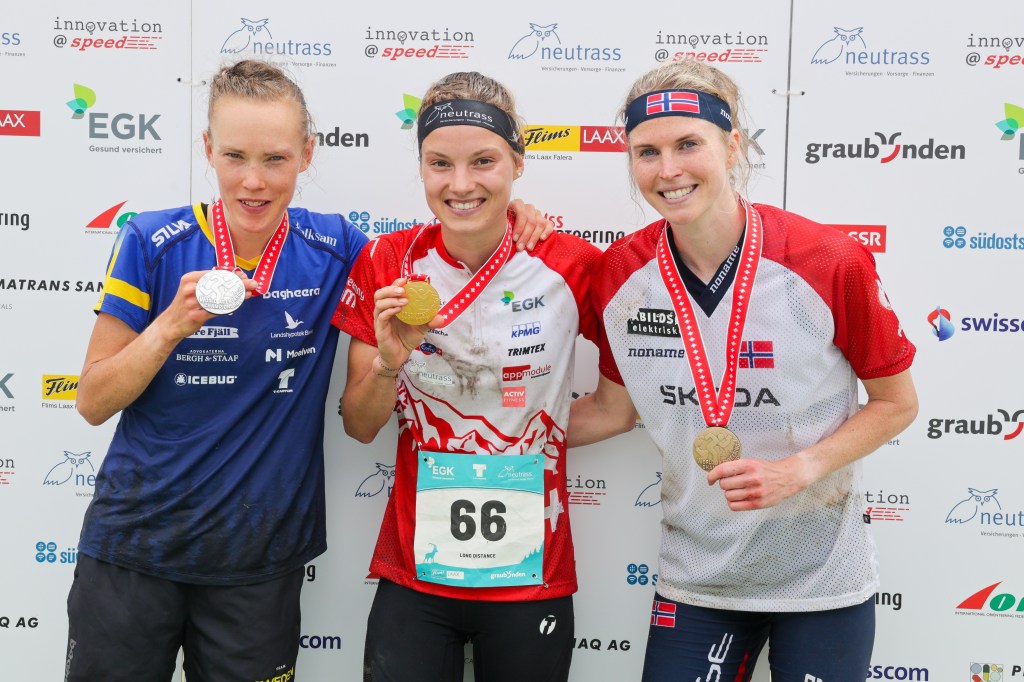
We can look into the 2 most interesting legs in the women’s course: leg 3-4, and leg 19-20.
LEG 3-4. On this leg, Simona began very early to work for the victory with a good routechoice and a clean execution. Tove, with execution problems in the last part of the leg (making a mistake), lost 2 minutes compared to the Swiss runner. For her part, Elena Roos, choosing the option on the left, obtained almost the same split as Simona, thus signing a good start that, in the end, would serve her to be close to the medals (6th place).
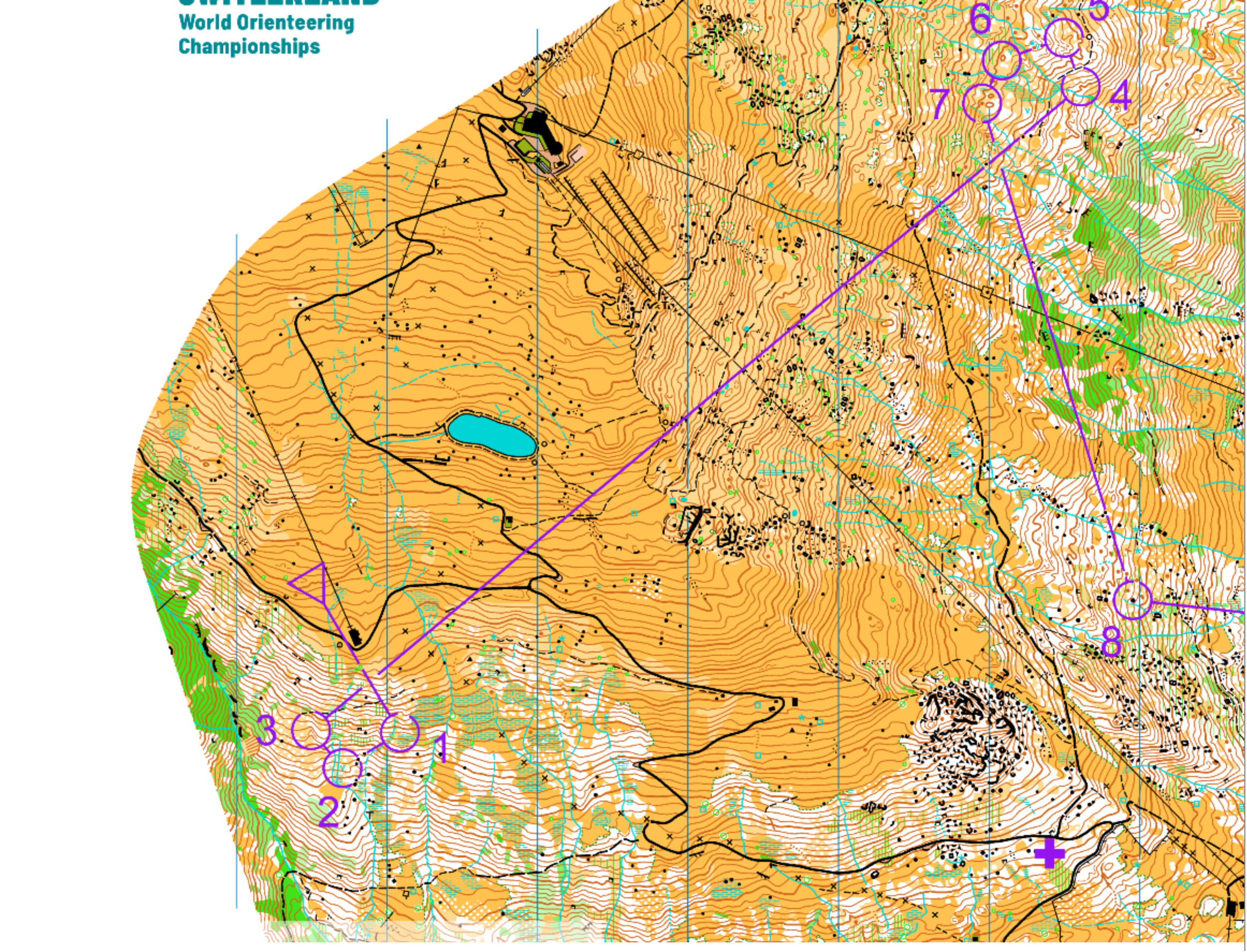
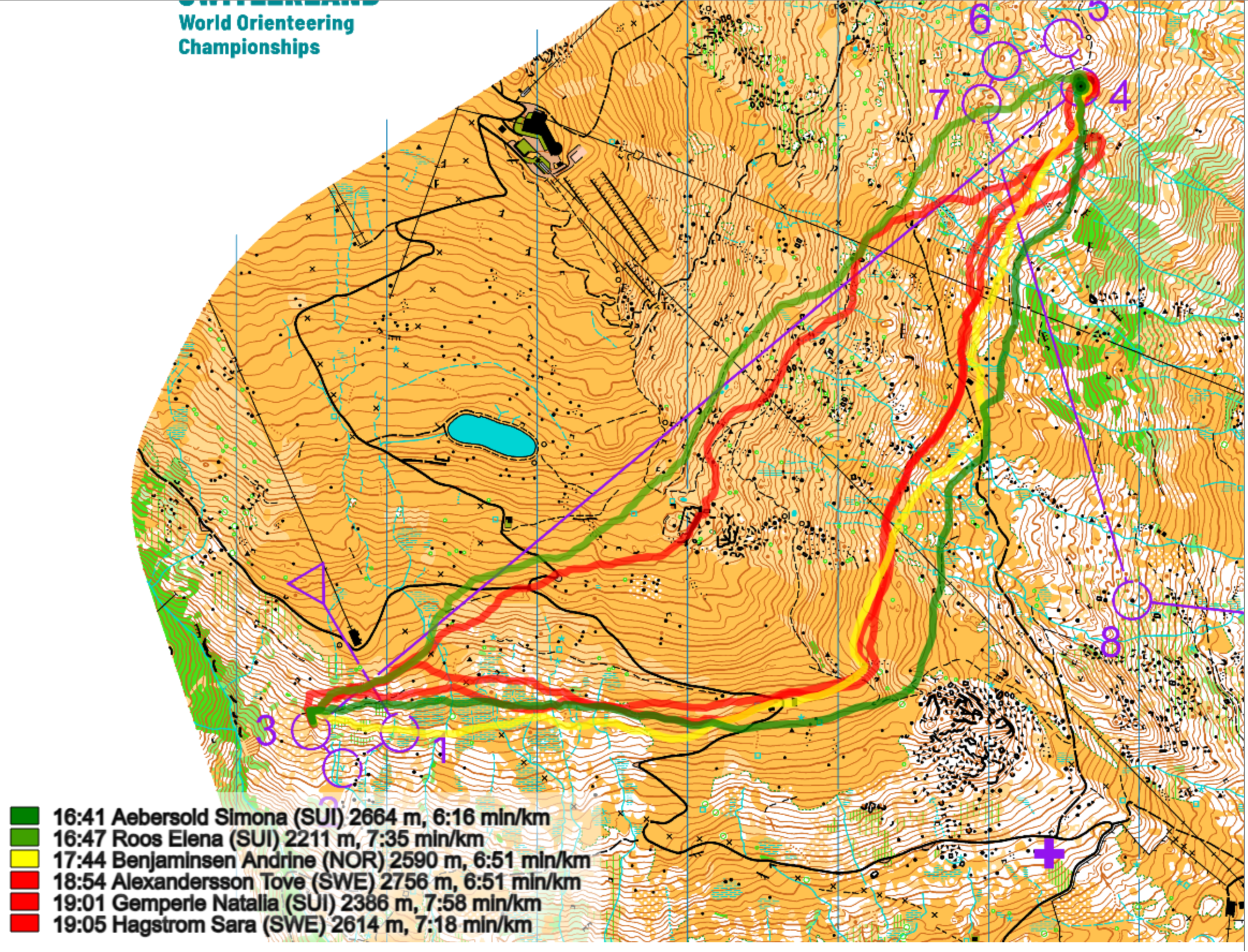
LEG 19-20. Almost at the end, when the legs were already very heavy, this leg came to put a last challenge to the runners. With 3 route options (none of the top 6 chose to run all the way to the right), Tove was right by opting for the central option, getting dangerously close to the lead of Simona, who opted for the option on the left, about 1 minute slower. However, the Swiss managed to minimize the losses and arrive at the arena with her first WOC gold in her pocket. The medal was moving away here for Hagström with a controversial choice, while Andrine and Natalia fought for the bronze in the end, this time falling on the Norwegian side.


11 000 m, 72 starting competitors
| Plac | Name | Organisation | Time | Diff | Km time |
|---|---|---|---|---|---|
| 1 | Simona Aebersold | Switzerland | 1:21:43 | 7:25 | |
| 2 | Tove Alexandersson | Sweden | 1:22:14 | +0:31 | 7:28 |
| 3 | Andrine Benjaminsen | Norway | 1:29:03 | +7:20 | 8:05 |
| 4 | Natalia Gemperle | Switzerland | 1:29:09 | +7:26 | 8:06 |
| 5 | Sara Hagstrom | Sweden | 1:29:23 | +7:40 | 8:07 |
| 6 | Elena Roos | Switzerland | 1:30:09 | +8:26 | 8:11 |
| 7 | Megan Carter Davies | Great Britain | 1:30:50 | +9:07 | 8:15 |
| 8 | Marie Olaussen | Norway | 1:31:47 | +10:04 | 8:20 |
| 9 | Venla Harju | Finland | 1:33:13 | +11:30 | 8:28 |
| 10 | Marianne Andersen | Norway | 1:36:31 | +14:48 | 8:46 |
MEN LONG DISTANCE: A hard-fought and tight victory for Kasper.
In the men’s class, a close battle was predicted between the defending champion, Kasper Fosser, and perhaps the favorite in this field, the Swiss Matthias Kyburz… and that is exactly what happened. Kyburz led the race until almost the end, but in the last routechoice Kasper chose better, gaining a minute on the Swiss and, therefore, proclaiming himself world champion in the long distance for the second time in a row. As in the women, the battle for bronze was very, very close. Finally, it was Olli Ojanaho who got the last pudium place, just 14 seconds ahead of Krivda and Svensk. Daniel Hubmann was still in bronce position before the last long leg, but the bad doing the same bad routechoice as Kyburz in the last long leg, took him away from the medals (finished 6th).

Let’s look into the 2 most interesting routechoices on the men’s class, which are indeed pretty similar as on the women’s class: leg 4-5, and leg 31-32.
LEG 4-5. On this leg we see who all the top6 runners, except for Ojanaho who went to the “left”, took the right routechoice with similar splits (some suboptimal micro-routechoices made Hubmann loose time here).

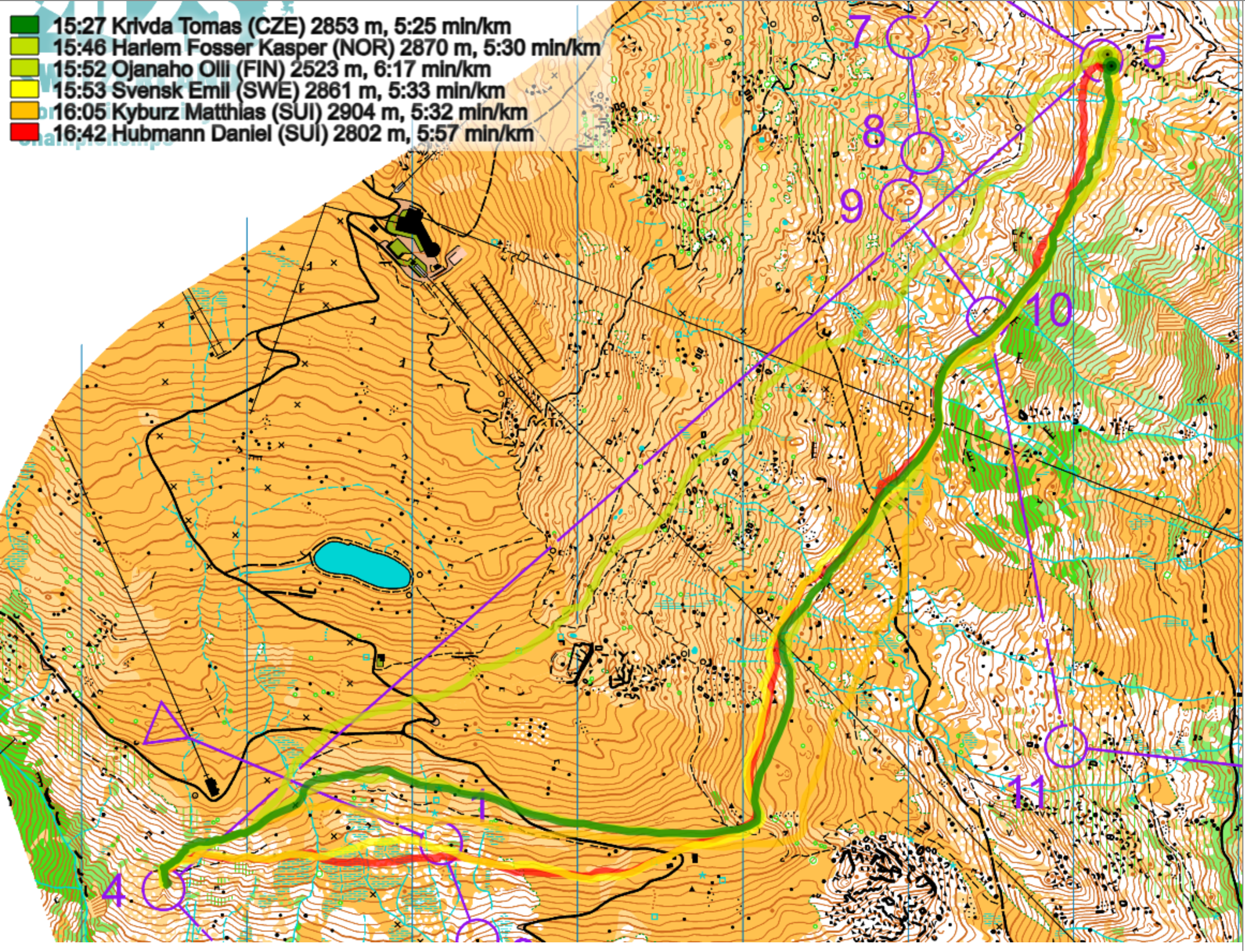
LEG 31-32. This leg was, indeed, the most decisive one of the race because it was decided here both the fight for the gold between Fosser and Kyburz, and the fight for the broze between Ojanaho, Krivda, Svensk, and Hubmann. This leg is the very same as in the women’s class, and here the central (straight) option was also over a minute faster than the right one. Among the top 6 runners, Fosser, Ojanaho and Krivda took the good option, while Kyburz, Svensk and Hubmann went to the left. That ended in Fosser beating Kyburz for the gold (he was half a minute behind before this leg), and Ojanaho (who was all the race away from top3) running away from the others to win the bronze. Great and decisive leg!
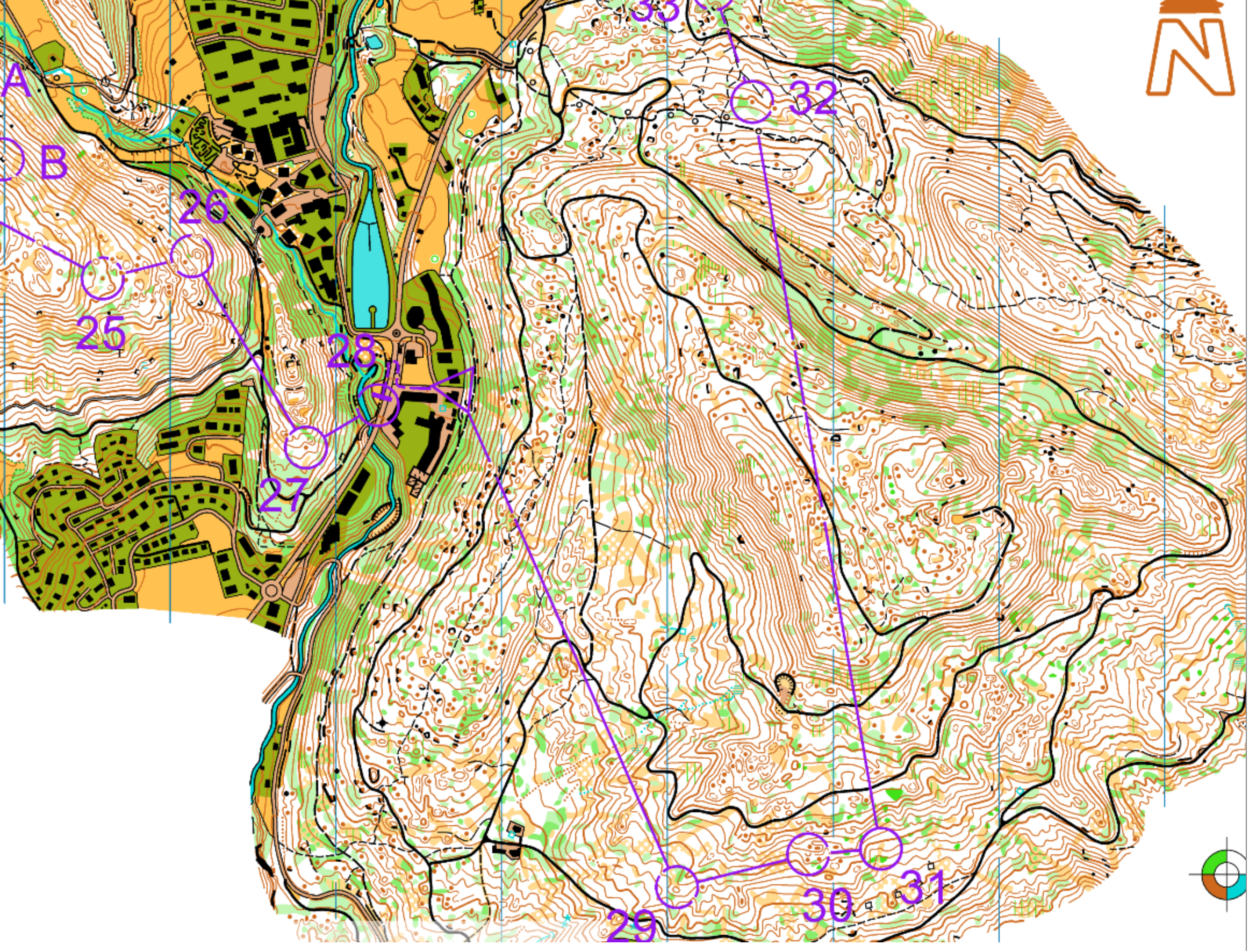
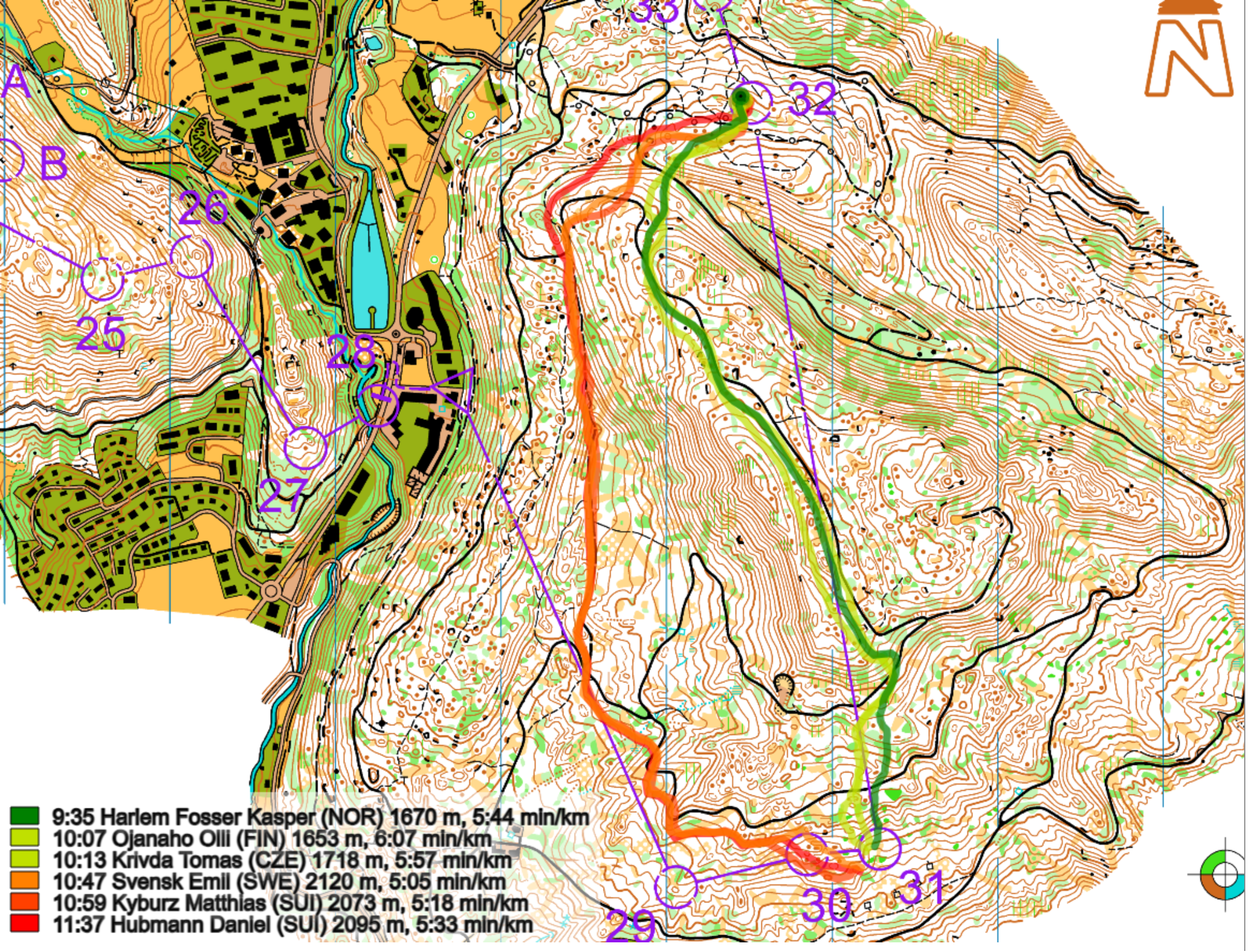
14 000 m, 78 starting competitors
| Plac | Name | Organisation | Time | Diff | Km time |
|---|---|---|---|---|---|
| 1 | Kasper Harlem Fosser | Norway | 1:33:06 | 6:39 | |
| 2 | Matthias Kyburz | Switzerland | 1:33:57 | +0:51 | 6:42 |
| 3 | Olli Ojanaho | Finland | 1:37:37 | +4:31 | 6:58 |
| 4 | Tomas Krivda | Czech Republic | 1:37:51 | +4:45 | 6:59 |
| 4 | Emil Svensk | Sweden | 1:37:51 | +4:45 | 6:59 |
| 6 | Daniel Hubmann | Switzerland | 1:38:30 | +5:24 | 7:02 |
| 7 | Joey Hadorn | Switzerland | 1:38:33 | +5:27 | 7:02 |
| 8 | Ruslan Glibov | Ukraine | 1:39:53 | +6:47 | 7:08 |
| 9 | Miika Kirmula | Finland | 1:41:02 | +7:56 | 7:13 |
| 10 | Milos Nykodym | Czech Republic | 1:42:35 | +9:29 | 7:19 |
MIDDLE DISTANCE: Great show by Alexandersson and Kyburz… and surprise by Bonek!
The terrain chosen for the Middle was simply perfect for a race of this discipline (at least in its first 2/3, until the controls near the lake). It is a dense forest, with reduced visibility, a multitude of micro-reliefs and a great abundance of detail, which makes it very difficult to progress in the desired direction. The runners needed their best techniques to succeed on the complicated legs brilliantly designed by the course-setters.
The last part of the course was noticeably less interesting, but by allowing a much higher running speed, it caused some of the favorites to make decisive mistakes at the end. Personally, I would have liked a full course in the first part, but… you had to get to the arena 😉 Also to be noted that both courses were too long in relation to what was planned, since the winning times were around 38 minutes, and the predicted ones were 34 minutes.

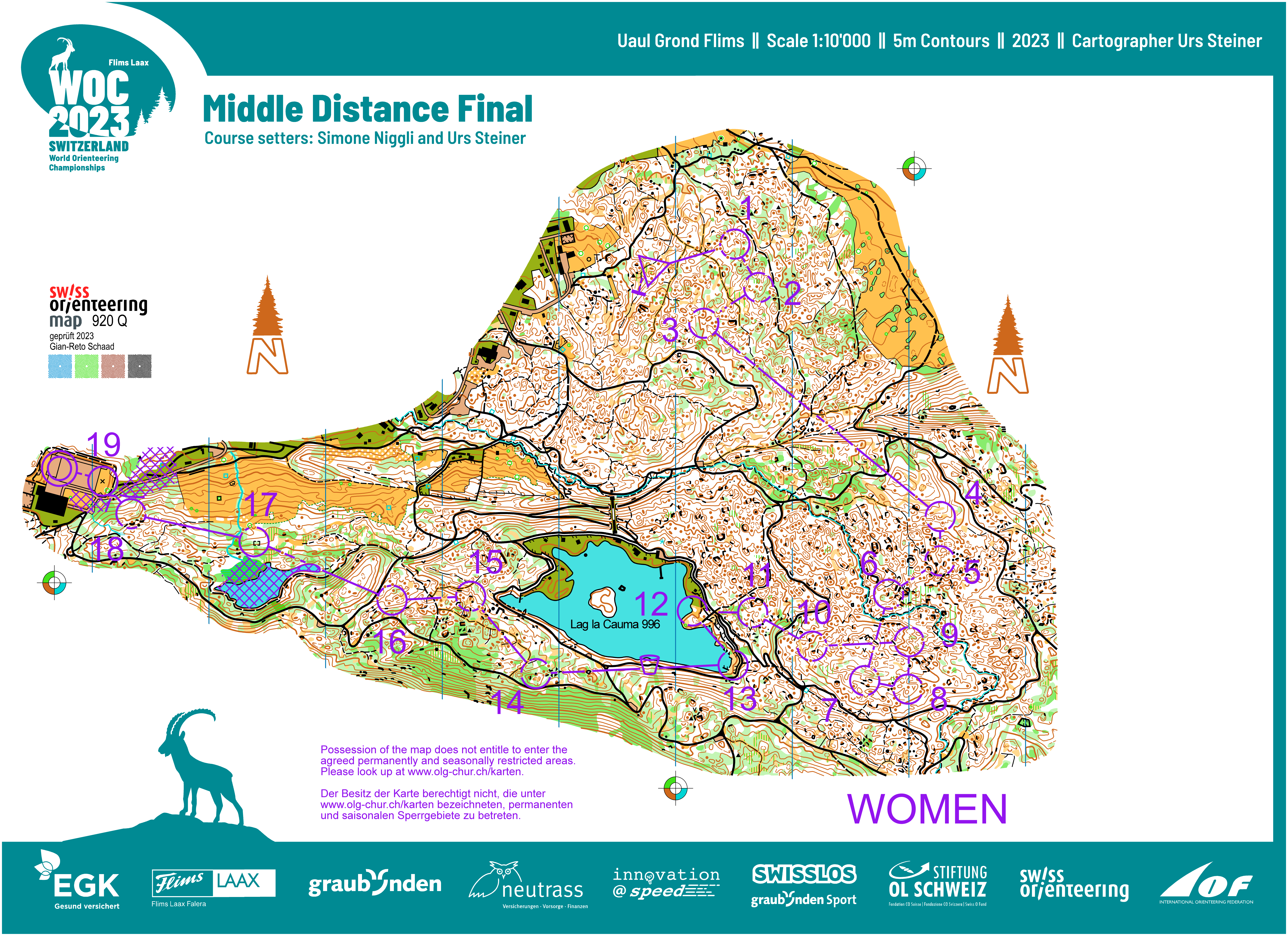
WOMEN MIDDLE DISTANCE: After a dangerous start, Tove came out on top
In the women’s class, the race was really exciting with very good performances, accompanied by big mistakes that were decisive for the fight for the medals. After a start with a major mistake, Tove Alexandersson brought out the magic wand and delivered a high-quality execution that clinched her gold. The fight for the rest of the places of honor was quite open until the last part, but a massive error by Aebersold at the 16th control left the way open for Natalia Gemperle (who was caught by Tove) and Hanna Lundberg, to get the silver and bronze medals respectively.

Here we can see some of the most important moments of the women’s race:


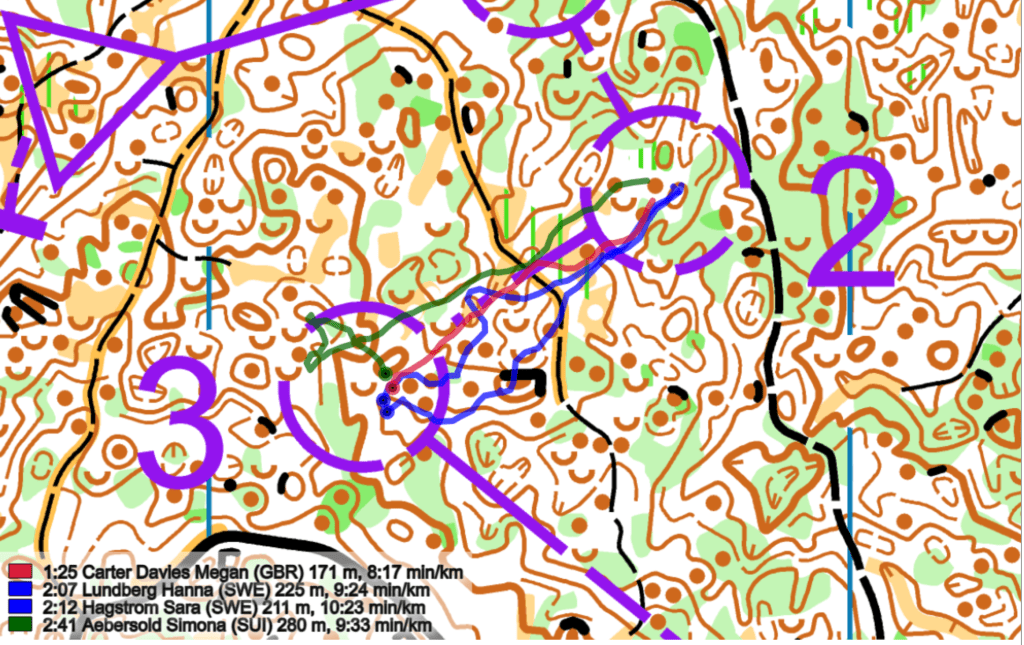
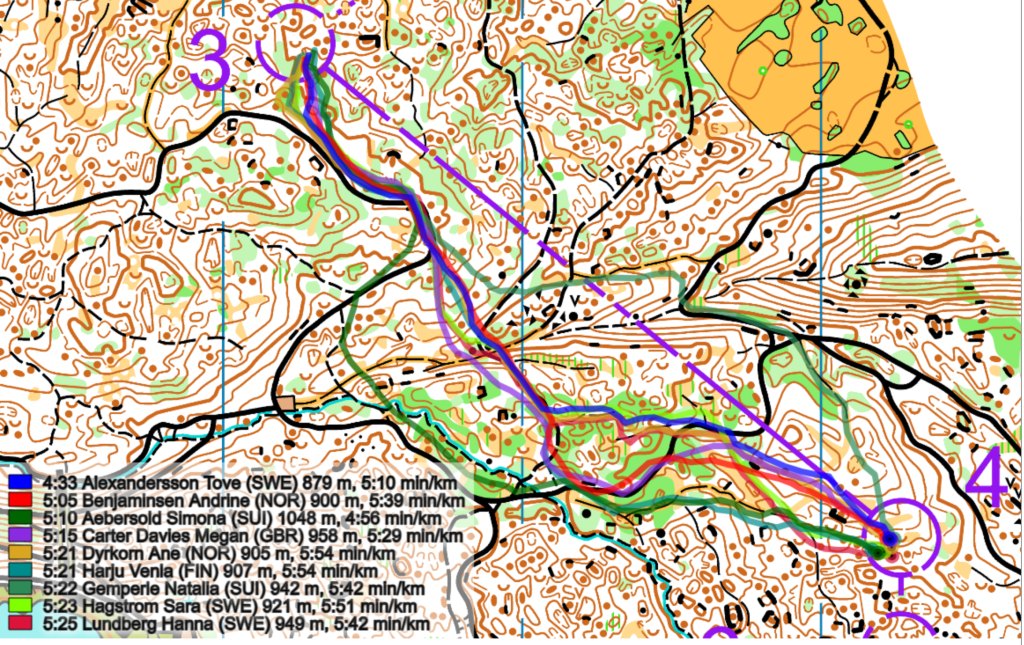
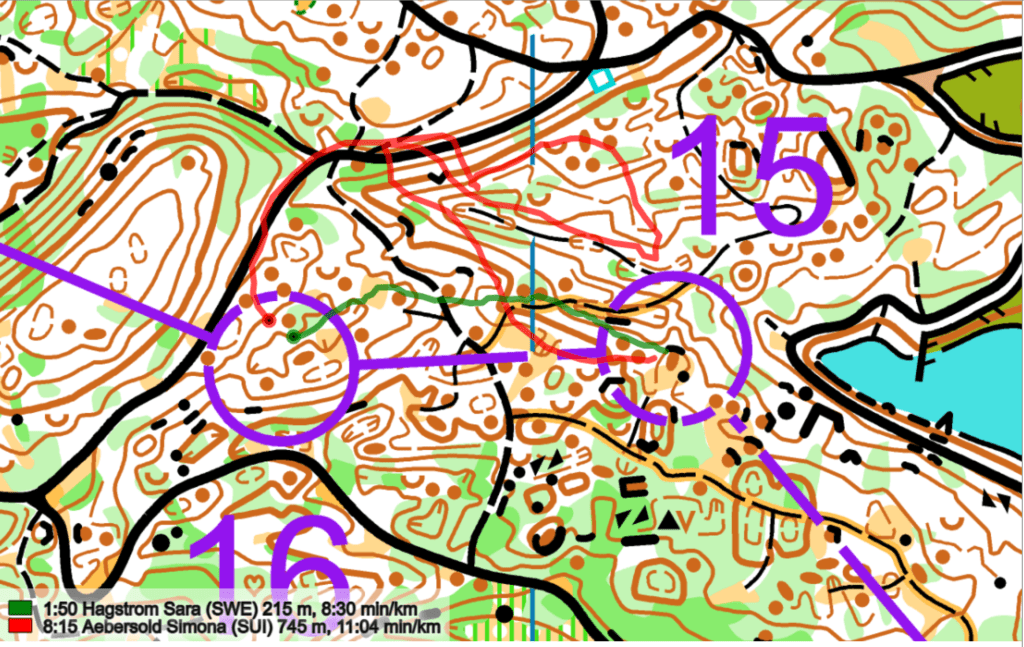
4 800 m, 60 starting competitors
| Plac | Name | Organisation | Time | Diff | Km time |
|---|---|---|---|---|---|
| 1 | Tove Alexandersson | Sweden | 37:26 | 7:47 | |
| 2 | Natalia Gemperle | Switzerland | 39:44 | +2:18 | 8:16 |
| 3 | Hanna Lundberg | Sweden | 40:00 | +2:34 | 8:20 |
| 4 | Ane Dyrkorn | Norway | 41:49 | +4:23 | 8:42 |
| 5 | Andrine Benjaminsen | Norway | 42:01 | +4:35 | 8:45 |
| 6 | Venla Harju | Finland | 43:11 | +5:45 | 8:59 |
| 7 | Sandra Grosberga | Latvia | 43:14 | +5:48 | 9:00 |
| 8 | Tereza Janosikova | Czech Republic | 43:46 | +6:20 | 9:07 |
| 9 | Sara Hagstrom | Sweden | 44:11 | +6:45 | 9:12 |
| 10 | Evely Kaasiku | Estonia | 44:48 | +7:22 | 9:20 |
MEN MIDDLE DISTANCE: Kyburz in another dimension and tight fight for the other two medals
In the men’s class, the Swiss Matthias Kyburz won uncontested victory, despite not making the best start, with enough time to celebrate with the public thanks to the more than two minute advantage over his pursuers. The rest of the positions of honor, however, were much more disputed. When everything seemed that both medals would be divided between the Swedes Bergman and Ridefelt, the physical strength and precision of Joey Hadorn and Janis Bonek in the very last part of the course, together with the suboptimal performance of the Swedes, gave the silver and bronze medals to the Swiss and the Austrian respectively in a very tight way. What ending!… and what a day for Bonek!

Here we can see some of the most important moments of the men’s race:
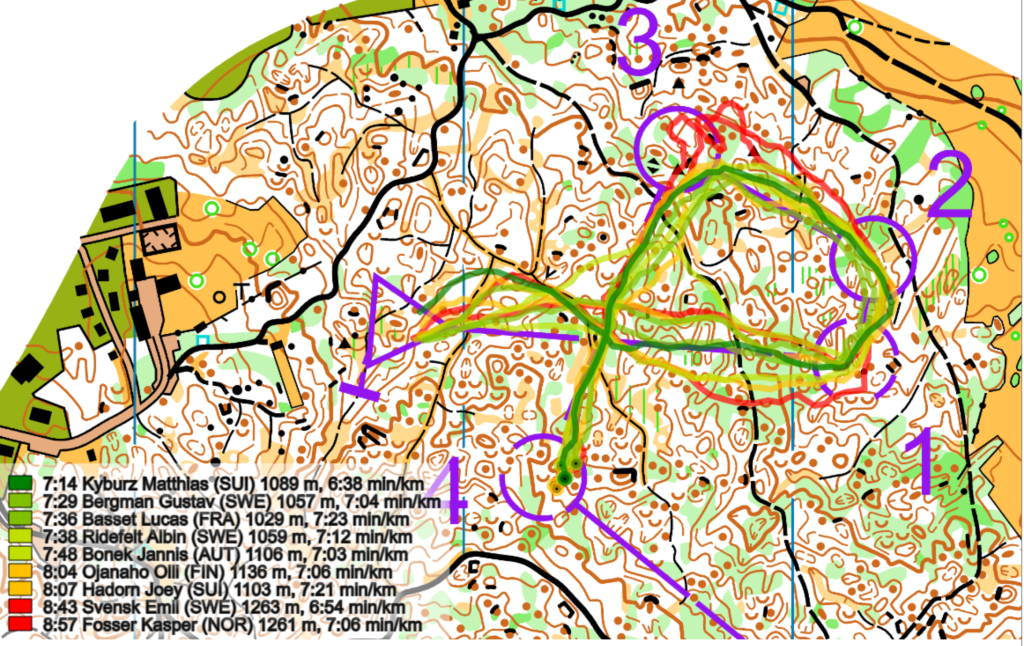
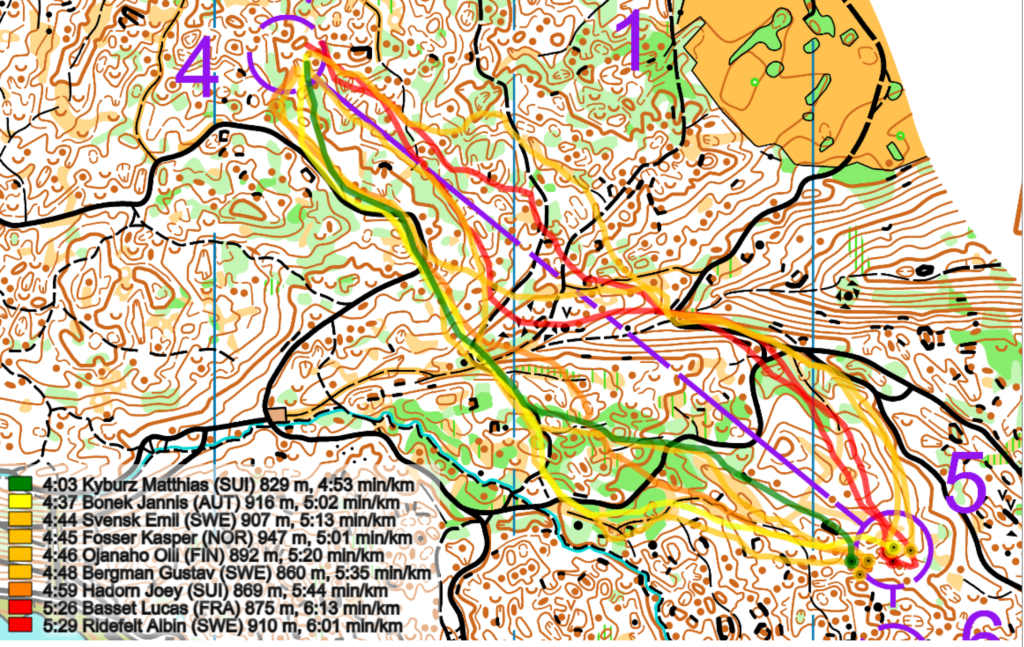


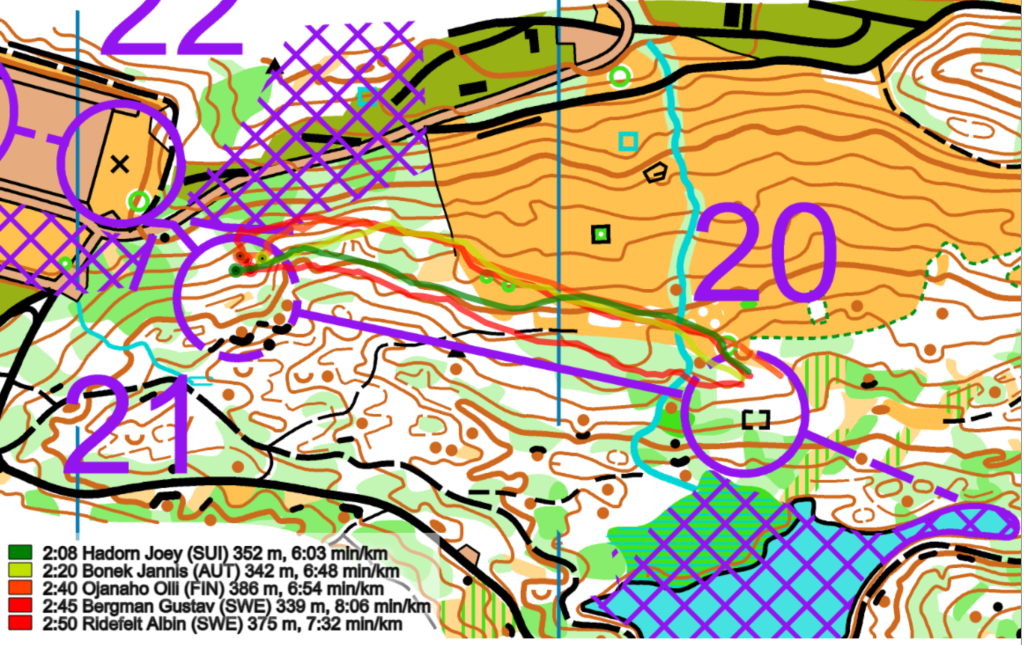
5 900 m, 61 starting competitors
| Plac | Name | Organisation | Time | Diff | Km time |
|---|---|---|---|---|---|
| 1 | Matthias Kyburz | Switzerland | 38:19 | 6:29 | |
| 2 | Joey Hadorn | Switzerland | 40:19 | +2:00 | 6:49 |
| 3 | Jannis Bonek | Austria | 40:26 | +2:07 | 6:51 |
| 4 | Albin Ridefelt | Sweden | 40:51 | +2:32 | 6:55 |
| 5 | Gustav Bergman | Sweden | 40:59 | +2:40 | 6:56 |
| 6 | Olli Ojanaho | Finland | 41:03 | +2:44 | 6:57 |
| 7 | Kasper Harlem Fosser | Norway | 41:43 | +3:24 | 7:04 |
| 8 | Eskil Kinneberg | Norway | 41:50 | +3:31 | 7:05 |
| 9 | Lucas Basset | France | 41:54 | +3:35 | 7:06 |
| 10 | Emil Svensk | Sweden | 42:16 | +3:57 | 7:09 |
RELAY: The greater physical than technical demand increased the differences at the end
Although we said that the areas chosen for the Long and Middle distance races were perfect for both modalities, due to the limitations of the arena and the surrounding terrain, the area where the Relay was held was not as interesting and fun to get a relay of the best quality. Because of that, the organizers offered courses where the physical aspect prevailed (in my opinion, too much), with steep slopes and short forks (fair enough). Also, the last loop after going through the arena was pretty irrelevant.
In any case, a relay race is always interesting and leaves many vibrant moments thanks to the added stress. In addition, 1 route choice in the women’s class, and 2 route choices in the men’s class added a little more interest to the broadcast.

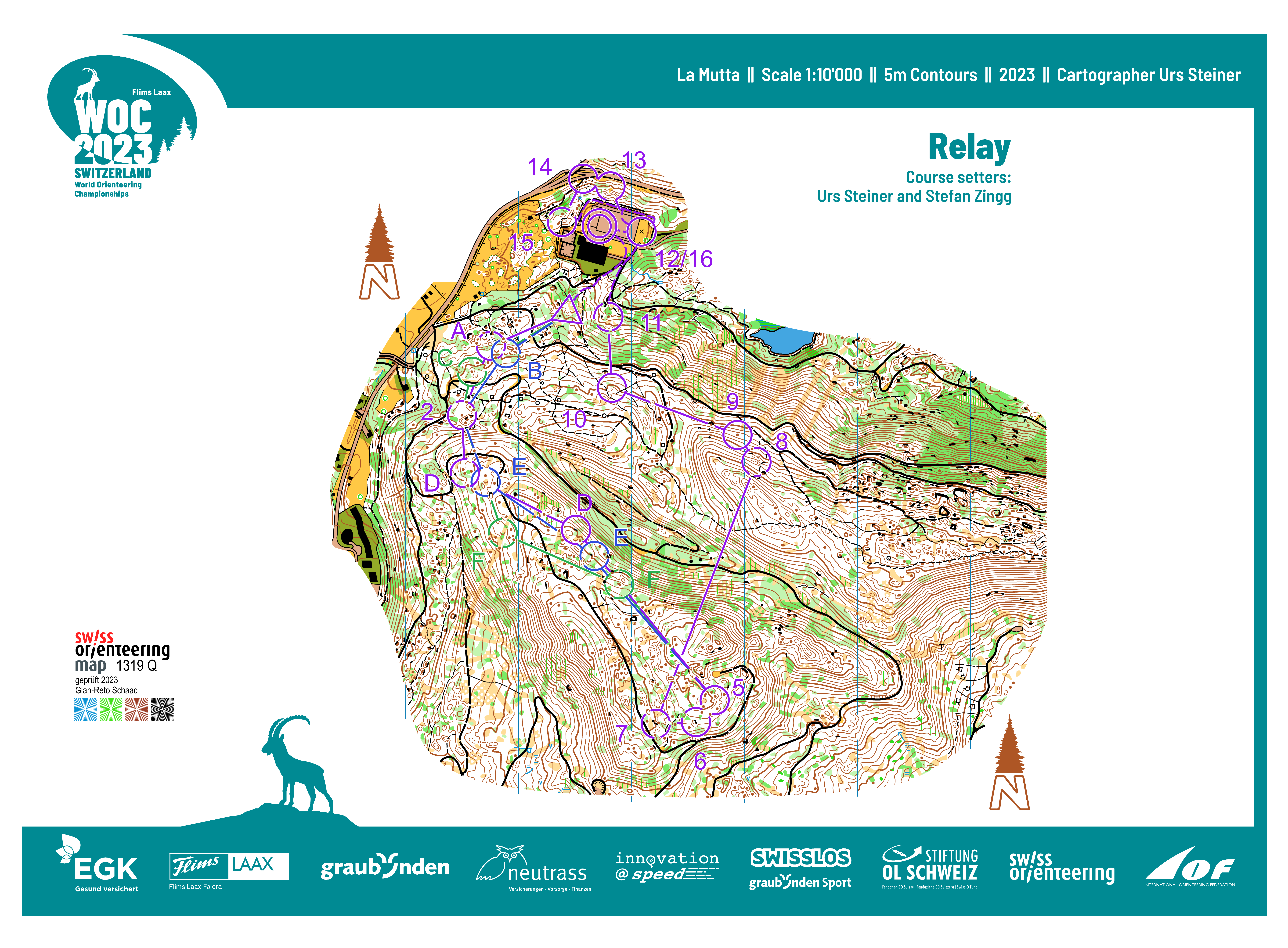
WOMEN RELAY: Solid win for Sweden, running away from the first leg
In the women’s class, the victory was clear for the Swedish team. With Lundberg in the first leg, they managed to open a gap of more than a minute over their pursuers, which was gradually increased by Hagström and Alexandersson in the legs 2 and 3. The silver medal went to the Swiss team, more than four minutes behind, made up of Roos, Gemperle and Aebersold. The Norwegian team, almost ten minutes behind the winners, completed the podium with the bronze medal (Andersen, Olaussen and Benjaminsen).
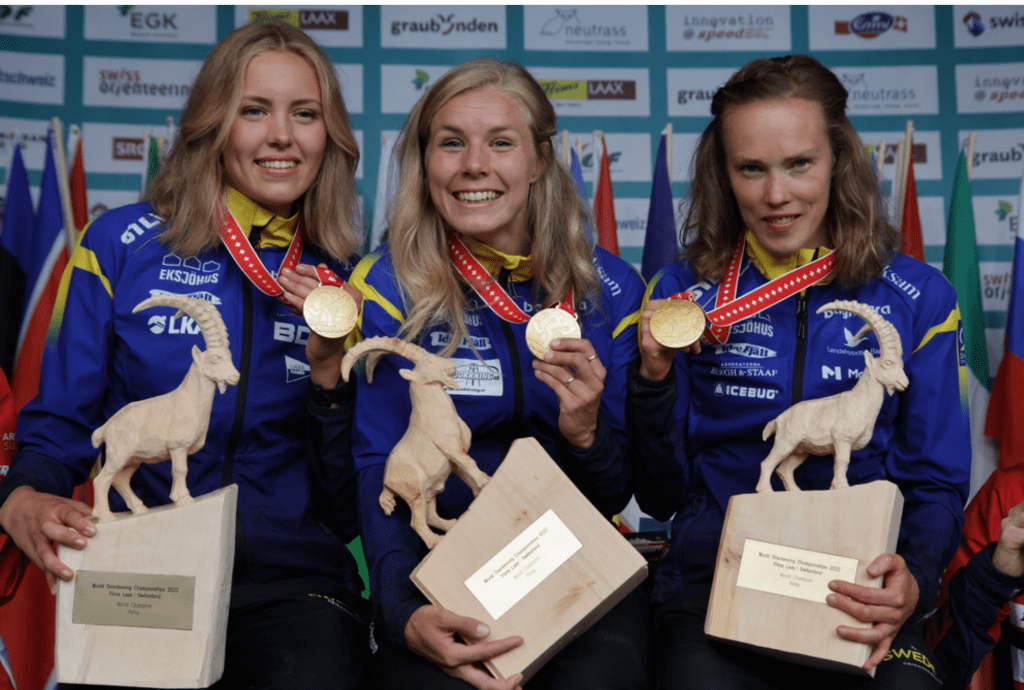
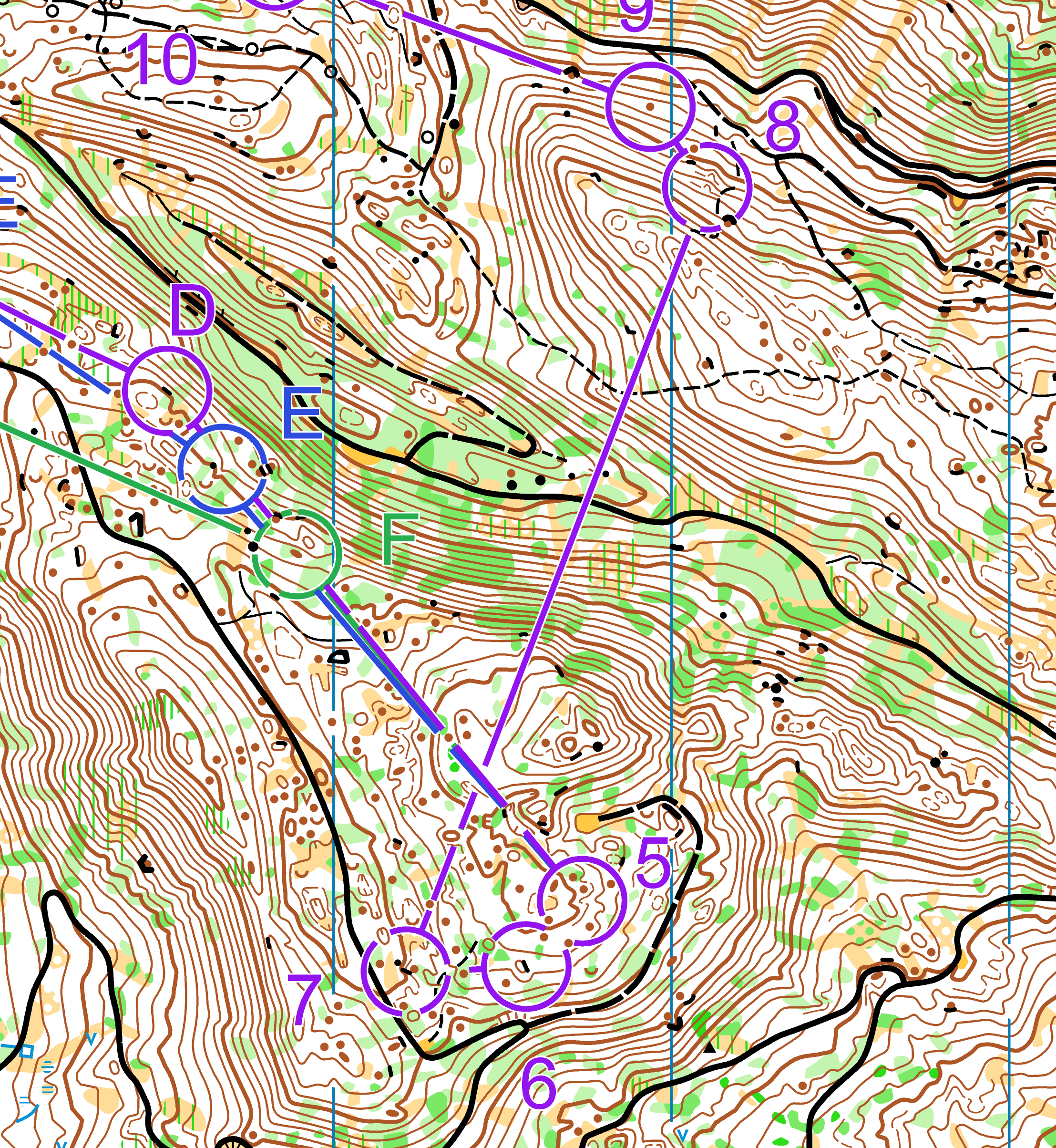

| Plac | Name | Leg time | Leg diff | Co plac | Diff |
|---|---|---|---|---|---|
| 1 | Sweden | ||||
| 1. Hanna Lundberg | 36:53 | 1 | |||
| 2. Sara Hagstrom | 36:24 | 1 | |||
| 3. Tove Alexandersson | 34:09 | 1 | |||
| 2 | Switzerland | +4:28 | |||
| 1. Elena Roos | 38:20 | +1:27 | 2 | +1:27 | |
| 2. Natalia Gemperle | 37:30 | +1:06 | 2 | +2:33 | |
| 3. Simona Aebersold | 36:04 | +1:55 | 2 | +4:28 | |
| 3 | Norway | +9:59 | |||
| 1. Marianne Andersen | 39:39 | +2:46 | 7 | +2:46 | |
| 2. Marie Olaussen | 40:04 | +3:40 | 3 | +6:26 | |
| 3. Andrine Benjaminsen | 37:42 | +3:33 | 3 | +9:59 | |
| 4 | Finland | +12:36 | |||
| 1. Miia Niittynen | 38:47 | +1:54 | 3 | +1:54 | |
| 2. Maija Sianoja | 41:23 | +4:59 | 5 | +6:53 | |
| 3. Venla Harju | 39:52 | +5:43 | 4 | +12:36 | |
| 5 | Czechia | +15:03 | |||
| 1. Vendula Horcickova | 42:11 | +5:18 | 13 | +5:18 | |
| 2. Denisa Kosova | 40:26 | +4:02 | 7 | +9:20 | |
| 3. Tereza Janosikova | 39:52 | +5:43 | 5 | +15:03 |
MEN RELAY: Perfect victory for Switzerland in the dreamed relay.
In the men’s class the battle for medals was much more even than in the women’s class. The Swiss team made up of Hubmann, Hadorn and Kyburz achieved gold despite a mistake by Kyburz in the last loop, which looked like it could end in drama. The solid performance of the Finnish team formed by Syrjalainen, Ojanaho and Kirmula achieved the silver medal 43 seconds behind the Swiss, and just 14 seconds in front of the Swedish team, which formed by Ridefelt, Bergman and Svensk, took the bronze medal.
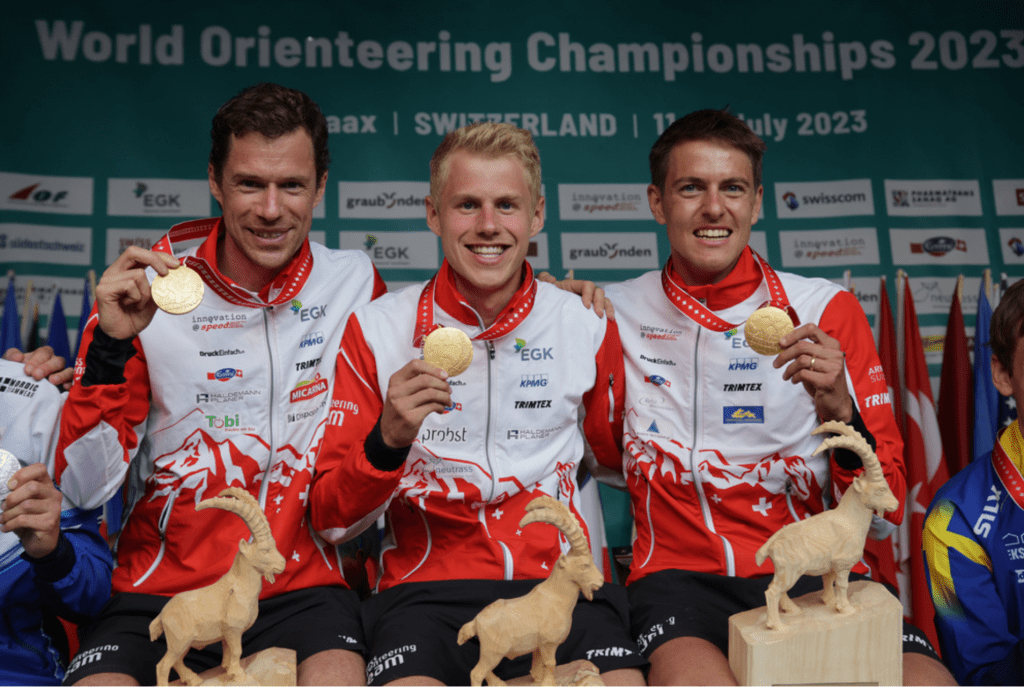

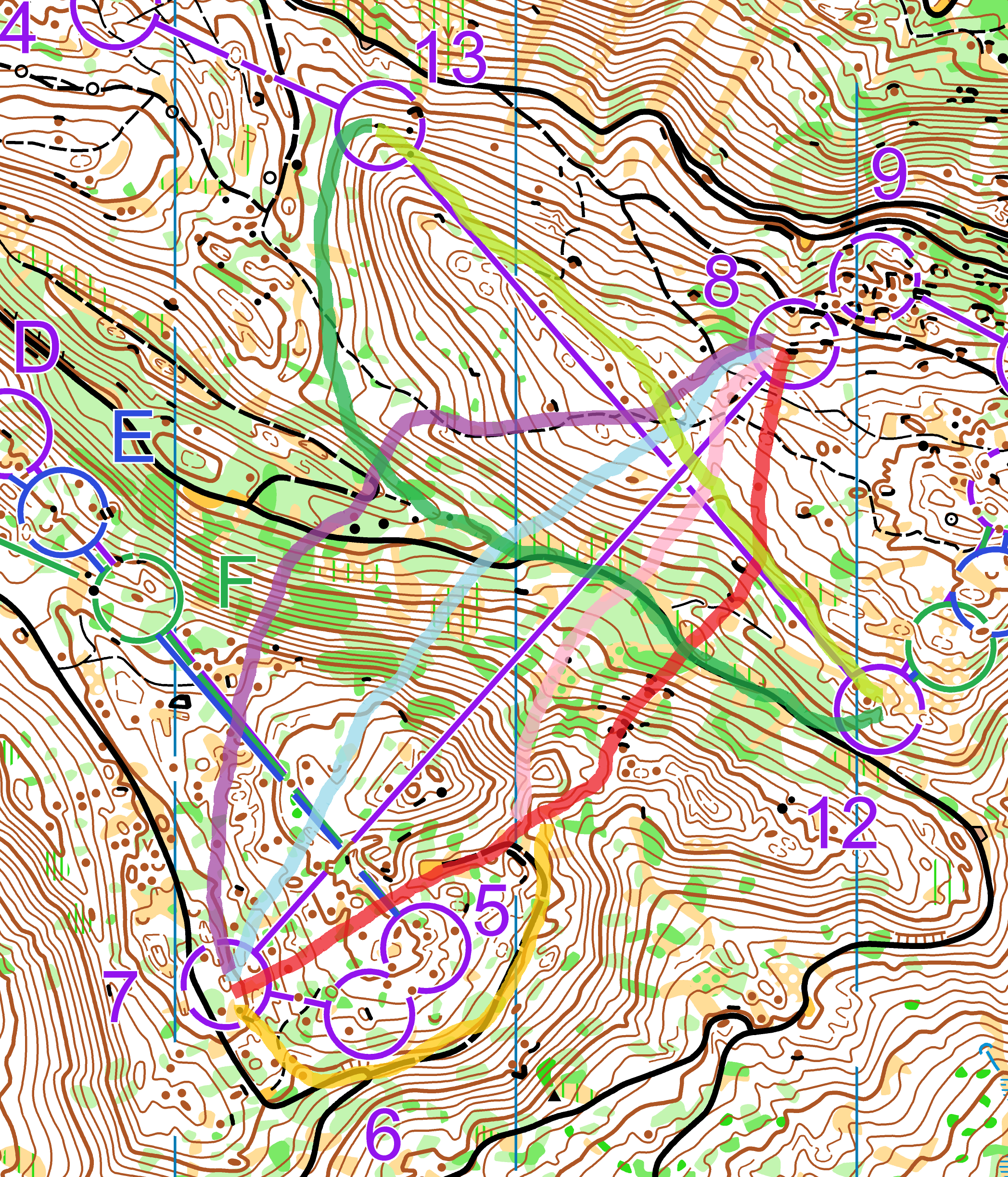
(7-8). Red one was the fastest.
(12-13). Light green was the fastest.
| Plac | Name | Leg time | Leg diff | Co plac | Diff |
|---|---|---|---|---|---|
| 1 | Switzerland | ||||
| 1. Daniel Hubmann | 39:40 | +0:21 | 4 | +0:21 | |
| 2. Joey Hadorn | 37:56 | 1 | |||
| 3. Matthias Kyburz | 39:40 | +1:24 | 1 | ||
| 2 | Finland | +0:43 | |||
| 1. Topi Syrjalainen | 39:42 | +0:23 | 5 | +0:23 | |
| 2. Olli Ojanaho | 39:37 | +1:41 | 2 | +1:43 | |
| 3. Miika Kirmula | 38:40 | +0:24 | 2 | +0:43 | |
| 3 | Sweden | +0:57 | |||
| 1. Albin Ridefelt | 39:31 | +0:12 | 3 | +0:12 | |
| 2. Gustav Bergman | 40:26 | +2:30 | 3 | +2:21 | |
| 3. Emil Svensk | 38:16 | 3 | +0:57 | ||
| 4 | Norway | +4:49 | |||
| 1. Lukas Liland | 39:23 | +0:04 | 2 | +0:04 | |
| 2. Kasper Harlem Fosser | 40:36 | +2:40 | 4 | +2:23 | |
| 3. Eskil Kinneberg | 42:06 | +3:50 | 4 | +4:49 | |
| 5 | France | +6:35 | |||
| 1. Guilhem Elias | 40:34 | +1:15 | 7 | +1:15 | |
| 2. Mathieu Perrin | 42:14 | +4:18 | 5 | +5:12 | |
| 3. Lucas Basset | 41:03 | +2:47 | 5 | +6:35 |
It was a very nice and exciting WOC. Congratulations to the medallists!
Did you like the content? You can buy me a cup of coffee 😉
